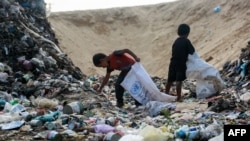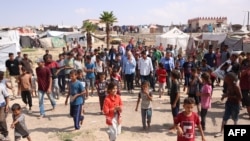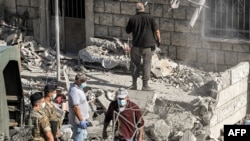The U.S. is demanding that Israel boost its humanitarian aid to famished Palestinians in Gaza within the next month or face the possibility that the United States would cut its military aid supporting Israel's yearlong war against Hamas militants.
U.S. Secretary of State Antony Blinken and Defense Secretary Lloyd Austin told top Israeli officials in a letter Sunday that Washington has "deep concern” over the deteriorating humanitarian situation in Gaza and seeks “urgent and sustained actions by your government this month to reverse this trajectory."
State Department spokesperson Matthew Miller said the missive was meant to be a private diplomatic communication but confirmed its veracity.
For months, even as Israel's fight against Hamas has raged on, the U.S. has repeatedly pressed Israel to ramp up its humanitarian assistance — food, water, medical supplies, fuel and other goods — to Palestinian civilians. But the humanitarian effort has waxed and waned, the effort hampered by the theft of goods by the militants, continued fighting near drop-off sites, and disputes over entry points into Gaza.
While some left-wing U.S. lawmakers have urged the administration of President Joe Biden to cut off military aid to Israel to pressure it to reach a cease-fire deal to halt fighting, the United States has continued to supply it, most recently on Sunday when Biden said he ordered the Pentagon to send Israel an advanced missile defense system and deploy about 100 U.S. troops to operate it.
The new U.S. effort to boost humanitarian aid into Gaza, the narrow territory on the shores of the Mediterranean Sea, comes as Israel has both ramped up attacks on Hezbollah militants in Lebanon and renewed its assaults on Hamas in northern Gaza. Both Hezbollah and Hamas, designated as terror groups by the U.S., are financially and militarily supported by Iran.
At the same time, Israel has ordered about 400,000 Palestinians remaining in the northern third of Gaza to leave the region and move south out of harm's way. But humanitarian aid remains a distinct concern.
The U.S. told the U.N. Security Council last week that Israel needs to urgently address "catastrophic conditions" among Palestinian civilians in the besieged Gaza Strip and stop "intensifying suffering" by limiting aid deliveries.
Blinken and Austin, in the letter to Israeli Defense Minister Yoav Gallant and Minister of Strategic Affairs Ron Dermer, listed specific steps Israel must take within 30 days to satisfy the U.S., including enabling a minimum of 350 trucks to enter Gaza each day through four crossings into Gaza and open a fifth entry point, instituting pauses in fighting to allow aid delivery and rescinding evacuation orders to Palestinian civilians when there is no operational need.
"Failure to demonstrate a sustained commitment to implementing and maintaining these measures may have implications for U.S. policy ... and relevant U.S. law," the letter said.
The Blinken-Austin letter cited the U.S. Foreign Assistance Act, which prohibits military aid to countries that impede delivery of U.S. humanitarian assistance.
It also cited Biden's National Security Memorandum issued in February that requires the State Department to report to Congress on whether it finds Israel's assurances credible that its use of U.S. weapons does not violate U.S. or international law.
U.S. officials earlier this year said Israel may have violated international humanitarian law using U.S.-supplied weapons during its military operation in Gaza.
Over several months, the amount of humanitarian aid being dispatched into Gaza has dropped more than 50%, and the quantity delivered in September "was the lowest of any month during the past year," Blinken and Austin said.
Attack in northern Lebanon
Meanwhile, the U.N. human rights office called Tuesday for an investigation into an Israeli airstrike Monday that killed at least 22 people in northern Lebanon.
U.N. human rights spokesperson Jeremy Laurence told reporters in Geneva that the agency received reports that 12 women and two children were among those killed in the airstrike in the village of Aito.
"We understand it was a four-story residential building that was struck. With these factors in mind, we have real concerns" with respect to the International Humanitarian Law, he said.
The Israeli military said Tuesday air sirens were activated in the Haifa region, while Israeli air defenses intercepted several launches that crossed from Lebanon into Israel.
Response to Iran
Israeli Prime Minister Benjamin Netanyahu told Biden that an Israeli retaliatory attack on Iran in response to more than 180 missiles Iran launched at Israel on Oct. 1 would target only military installations, and not oil or nuclear facilities, according to U.S. officials.
The officials were cited by the Washington Post and Wall Street Journal, which both reported late Monday that Netanyahu made the pledge during a phone call between the leaders last week.
The Iranian attack came in response to Israel's killing of Hassan Nasrallah, head of the Iran-backed Hezbollah militant group, and amid a surge in the conflict between Israel and Hezbollah. Israel has vowed to retaliate.
The Hamas attack on Israel a year ago killed 1,200 people and led to the capture of about 250 hostages. Israel's counteroffensive in Gaza has killed more than 42,300 Palestinians, with more than half of them women and children, according to Gaza health officials. The Israeli military says the death toll includes thousands of Hamas fighters.
Some material in this report came from The Associated Press, Agence France-Presse and Reuters.










